The longevity of an electric car’s battery is a key concern for many new and used buyers. It’s a known fact that batteries lose performance with time, and many potential electric vehicle (EV) owners worry about the cost of a replacement if range loss or battery failure becomes an issue.
The latter of those scenarios is exceptionally rare. Batteries and electric motors are typically much more reliable than conventional petrol and diesel engines since they have far fewer moving parts.
Matt Cleevely, managing director of Cleevely EVs, the UK’s biggest independent EV specialist servicing centre, says: “we’ve only seen two cases in three years, and those weren’t battery failures, but individual cell faults. One was a two-year-old taxi with 120,000 miles on the clock and the other was over 10 years old. In both cases we swapped it out for a second-hand unit that significantly extended the life of the car, didn’t compromise the state of the pack, and cost less than £1,000 to complete the work.”
How Much Does it Cost to Replace – or Upgrade – an EV Battery Pack?

Range loss is a fact of life for EVs, and most independent EV garages are now seeing frequent business in upgrading first-generation Nissan Leafs, which were some of the first EVs sold in the UK. Many of these early cars are seeing real-world range of just 50 miles per charge (down from the circa 90 real-world miles when new), but you can upgrade to a 40kWh lithium-ion battery pack with a 150-mile real-world range for £8,500, with all costs and labour included.
This would be done using second-hand batteries from a crashed example of the current Nissan Leaf, but the sealed battery pack is uncompromised and guaranteed by Cleevely EVs, albeit only for three months. The old batteries taken out of the mk1 Leafs are often then repurposed as stationary power storage (typically used in conjunction with solar panels).
How Quickly Will EV Range Drop?

The maximum range you get in an EV will always drop over time, but it varies a lot depending on how you charge the car, and more. Those mk1 Nissan Leafs, for instance, have very different battery chemistry from modern EVs and are prone to losing range more quickly. It’s also common to see batteries lose more range in the first few years, and then for degradation to slow noticeably: it’s not a linear loss of range and battery performance.
Tesla has an excellent reputation for battery performance. In 2018, a group of 419 Tesla owners across the US and Europe pooled data from their vehicles, including the Tesla Model S, X and 3. It showed that on average, the cars retained 95.6% of the battery capacity after 31,000 miles, with the degradation rate then slowing so that it still retained 94% performance at 62,000 miles. Typically, battery performance remained at more than 90% even after 150,000 miles. That’s reflected in the many examples of Teslas and other EVs doing 200,000 and even 300,000 miles or more on the original battery.
Other battery types may not be quite as good as Tesla’s, but all modern EVs use similar chemistry, and it would be quite realistic to expect a well-maintained battery to have lost around 15% after 100,000 miles and ten years. To back that up, Geotab (a data analysis company) has recorded battery health data from 6,300 fleet EVs, including 21 different models, over an ongoing period. The results show that on average, the electric car batteries retained 87.9% of their as-new performance after six years.
Don’t forget that most manufacturers also provide an eight-year, 100,000-mile warranty for the battery, with many also guaranteeing to replace or refurbish the battery if it drops below 70% performance within that period. That means that you can easily pick up a great used EV that’s still got some four or five years of manufacturer battery warranty.
How to Maintain EV Battery Performance

There are ways of managing a battery to keep it in good condition. Manufacturers recommend running between 20 and 80% battery charge in routine use, and topping up to 100% only when you need the full range. This is something that Matt Cleevely echoes. “It also helps to use a variety of charging methods,” he says. “Avoid routine rapid charging, but also try not to always just use 7kW; it’s actually good to do a variety of charging. Don’t let the car stand for long periods with 100% battery, either. Correct use of the pack has a massive reflection on the overall reliability and degradation of the pack.”
In short, the battery in a modern EV will very likely outlive the car itself. It is simply a myth that an EV will need a new battery in a few years, and there’s a decade and more of data from Nissan, Renault and Tesla to prove that.
Maintain the battery well on an EV that has a long enough range to suit your needs, and the cost of a replacement battery should never be a concern.
